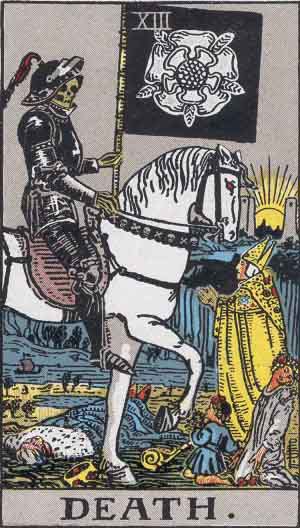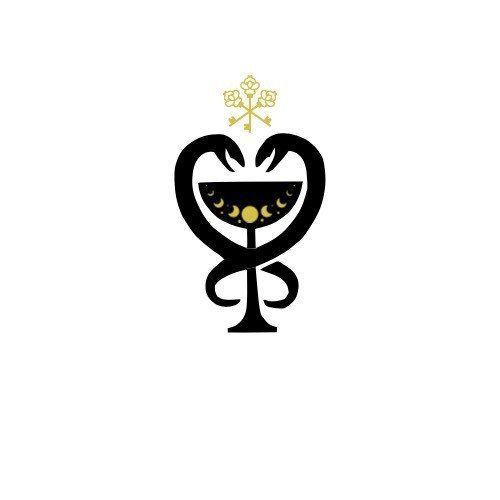Hello Scorpio Season! A Journey Through the Land of the Death Card
Fear not mere mortal, Death is here to alchemize what no longer serves us. The Death card represents Scorpio, ruled by the planet Pluto. Pluto is the planet of death and rebirth, spiritual reclamation, and new potential. Pluto is associated with Hades, ruler of the underworld, in Greek mythology. Pluto rules the 8th house of resurrection, sexual relations, transmutation, literal and metaphorical inheritances, and emotional depths.

Scorpio is arguably the most misunderstood sign of the zodiac. It is perhaps rivaled only by Gemini in terms of shallow public bias, but like most misunderstood things it contains a depth of wisdom fundamental to the balance of life. It is only fitting that a sign as rich as Scorpio would correspond to an equally misunderstood tarot card. The Death card is number 13 in the major arcana, which also ties it to The Emperor via numerological reduction (13, 1+3 = 4, number 4 being The Emperor.) In Colman Smith’s rendition of the card, we see a skeleton in black armor on horseback brandishing a black flag with one open white rose on it. The horse’s pure white appearance creates a stark contrast against a scene of destruction as our antihero stares ahead through an eyeless skull. He approaches a pleading religious leader who appears to be bargaining for mercy. A figure that shares a striking resemblance to the person in the Strength card (number 8, major arcana) falls back on her knees with a look of total surrender in her face. Another unidentified character lays outstretched beneath Death’s horse. In the distance it appears as if a dam has burst releasing a previously stunted body of living water.
Despite these initial horrors, the card is equally rich with promise for renewal
if you are able to contextualize them among the chaos. This is highly symbolic of the shape in which Scorpio energy moves. The white rose on the flag implies that a hope for peace accompanies our harbinger of Death. On the horizon above the flow of water, we see two towers akin to the ones in The Moon card (number 18, major arcana) but instead of being presided over by the hazy and feral moonlight, we see a cresting sun creeping out from between its pillars. While it could technically be setting, there is a definitive feeling of rising when I look at this sun. It peers across the dim landscape as the liberated water fertilizes the barren land. The adults in the image are all in positions of reconciling their fates or succumbing to them, but it is the image of a youth that epitomizes the potent medicine of this card. At the foot of Death’s horse stands a small child who looks up into Death’s face, as if curious to see what treasures he may present him with.
Now, I’d like to take this opportunity to talk about compost. Composting is the process of breaking down food scraps and organic materials into fresh soil, thick with the lifeforce of its contents. It requires the decay of what is no longer appropriate for direct consumption, moisture to reconstitute the wilting matter, and heat to expedite the breakdown process. We then take that soil and use it to nurture new life. I love looking to this process for inspiration while being with Scorpio, Death card, Pluto, and/or 8th House energy. They teach us that death and rebirth are mandatory functions of nature and that what no longer sustains us can be alchemized into new growth.
This process helps tether us to the cyclical nature of life in spite of our anti-death and aging culture. We embrace the value of life, death, and rebirth by facilitating a full-circle return of natural materials back to the land. This is infinitely preferable to ingesting spoiled rations, or wrapping naturally transmutable waste in forever-plastic to break down in isolation, never returning to the earth from which it sprouted. This necessary decay, deep excavation of rot, and alchemical transformation is the precise medicine of the Death card.
Scorpio season spans from October 23rd to November 21st of the Gregorian calendar each year. Here in the Northeastern US it is when the green leaves of spring and summer burst into an impassioned blaze of red, yellow, and orange. There is a sense of rapture in this annual display as the wheel turns steadfastly toward Sawain. The flamboyance of this ritual death is like an encore from our deciduous tree allies leaving everything on the stage before falling to the earth like piles of curled papyrus. If left undisturbed, the beds of fallen tree offerings create a natural ground cover that fertilizes the earth and creates a barrier against invasive cold-hardy plants. The now bare trees turn gracefully inward, engaging a state of radical rest until the first silent stirrings of Imbolc. These plant allies act as a gorgeous source of metaphor for engaging cycles with agency while moving through the Plutonian Valley.
A storyline that comes to mind in reference to the Death card is 2007’s “Juno,” starring Elliot Page, Michael Cera, Jason Bateman, and Jennifer Garner. Title character Juno MacGuff (Elliot Page) is a pregnant teenager looking for a stable, loving couple to adopt the unborn child. With the support of Juno’s parents and respectful distance from best friend and partner in conception Paulie Bleeker (Michael Cera) Juno connects with Vanessa (Jennifer Garner) and Mark Loring (Jason Bateman) to discuss adoption. The remainder of the film follows Juno through a series of growing pains as this seemingly perfect arrangement reveals a hidden rot. Juno, being naturally unconventional and too young to understand the unspoken conventional etiquette of adults, befriends Mark Loring after discovering their mutual love of punk rock.
Vanessa, who wants to be a mother more than anything in the world, appears utterly gripped with fear and anxiety throughout the film. She is a well-meaning raw nerve, always anticipating disaster after a prior adoption arrangement fell through at the last moment. Mark, on the other hand, appears cool, calm, and collected. He is much more interested in discussing Sonic Youth, horror flicks, and his Les Paul guitar with the teenager than he seems to be in the prospect of fatherhood. This atmosphere becomes tangible to the viewer before it becomes tangible to our protagonist, coming to a head in a scene at Mark and Vanessa’s home. One day while Vanessa is out, Juno and Mark discuss mix tapes and Mott the Hoople in Mark’s basement pseudo-bachelor pad. They begin to slow dance to “All The Young Dudes,” baby-bump set between them. Juno seems to drift off like a child sleepily dancing with one’s favorite uncle. This temporary innocence is shattered when Mark reveals his plans to leave Vanessa and pursue his dreams.
The scene culminates in a confrontation about the nature of their relationship. Vanessa comes home to discover a distraught Juno being hushed by Mark. Our previously anxious and overly serious Vanessa’s maternal instincts to protect the teen present themselves instantly. She is sturdy and firm, looks him in the eyes, and says “What did you do.” This soft power may be easily missed, but it is one of my favorite moments in the film. Mark goes on to reveal his true feelings about becoming a father and working indefinitely as an advertisement jingle composer. Deeply rocked by utter disillusionment with a previous role model, Juno takes off in the signature blue minivan before pulling over on the side of the highway, hyperventilating. There our protagonist experiences a massive catharsis, tears and sobs ripping through a typically precocious face. This feral expression of the pains of disappointment, disenchantment, or disillusionment is deep Scorpio medicine. Once this emotional dam is cleared, the solution becomes clear to Juno. Vanessa is still capable of being a loving mother to this child, even without the half-hearted support of a husband stuck in the past.
Through this painful and demoralizing experience, all parties are able to come to a more genuine and authentic path. Mark presumably goes off to live some sort of city life, Vanessa becomes a mother, and Juno steps over the threshold of adolescence and into personal agency. Juno becomes empowered to approach Paulie with emotional honesty and they shift from best friends to romantic partners. Everyone is better off in the end than they were in the beginning, despite the thorny nature of the experiences themselves. This necessary purging, this pruning of dead matter for the betterment of the whole, is the white-rose offering of the Death card.
So whenever the Death card presents itself to you, evaluate what in your life needs literal or metaphorical composting. Scorpio season is a fantastic time to make this an embodied practice. Go deeply inward in search of what no longer serves you. Bare it bravely on your chest with arms wide open as an offering to the harbinger of the Death card. Be reborn as the Page of Cups. What has spoiled cannot sustain us, what is false cannot teach us, and what is rotten cannot support us. It is a part of human nature to cling to the things that cause us grief for fear of change. This excavation process is not necessarily glamorous or comfortable, but it contains real solutions if you act with agency. My wish for you is a ritual shedding that rivals the intensity of autumn leaves, alchemizing what we can no longer carry into a thing of wild and untamed beauty.
Cheers,
Sarah

